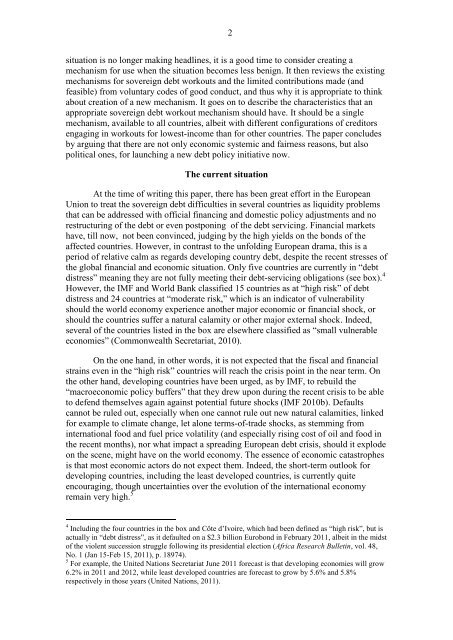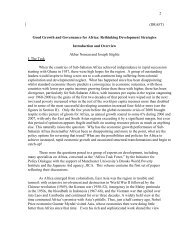How to Resolve Sovereign Debt Crises in the - Initiative for Policy ...
How to Resolve Sovereign Debt Crises in the - Initiative for Policy ...
How to Resolve Sovereign Debt Crises in the - Initiative for Policy ...
- No tags were found...
Create successful ePaper yourself
Turn your PDF publications into a flip-book with our unique Google optimized e-Paper software.
2situation is no longer mak<strong>in</strong>g headl<strong>in</strong>es, it is a good time <strong>to</strong> consider creat<strong>in</strong>g amechanism <strong>for</strong> use when <strong>the</strong> situation becomes less benign. It <strong>the</strong>n reviews <strong>the</strong> exist<strong>in</strong>gmechanisms <strong>for</strong> sovereign debt workouts and <strong>the</strong> limited contributions made (andfeasible) from voluntary codes of good conduct, and thus why it is appropriate <strong>to</strong> th<strong>in</strong>kabout creation of a new mechanism. It goes on <strong>to</strong> describe <strong>the</strong> characteristics that anappropriate sovereign debt workout mechanism should have. It should be a s<strong>in</strong>glemechanism, available <strong>to</strong> all countries, albeit with different configurations of credi<strong>to</strong>rsengag<strong>in</strong>g <strong>in</strong> workouts <strong>for</strong> lowest-<strong>in</strong>come than <strong>for</strong> o<strong>the</strong>r countries. The paper concludesby argu<strong>in</strong>g that <strong>the</strong>re are not only economic systemic and fairness reasons, but alsopolitical ones, <strong>for</strong> launch<strong>in</strong>g a new debt policy <strong>in</strong>itiative now.The current situationAt <strong>the</strong> time of writ<strong>in</strong>g this paper, <strong>the</strong>re has been great ef<strong>for</strong>t <strong>in</strong> <strong>the</strong> EuropeanUnion <strong>to</strong> treat <strong>the</strong> sovereign debt difficulties <strong>in</strong> several countries as liquidity problemsthat can be addressed with official f<strong>in</strong>anc<strong>in</strong>g and domestic policy adjustments and norestructur<strong>in</strong>g of <strong>the</strong> debt or even postpon<strong>in</strong>g of <strong>the</strong> debt servic<strong>in</strong>g. F<strong>in</strong>ancial marketshave, till now, not been conv<strong>in</strong>ced, judg<strong>in</strong>g by <strong>the</strong> high yields on <strong>the</strong> bonds of <strong>the</strong>affected countries. <strong>How</strong>ever, <strong>in</strong> contrast <strong>to</strong> <strong>the</strong> unfold<strong>in</strong>g European drama, this is aperiod of relative calm as regards develop<strong>in</strong>g country debt, despite <strong>the</strong> recent stresses of<strong>the</strong> global f<strong>in</strong>ancial and economic situation. Only five countries are currently <strong>in</strong> “debtdistress” mean<strong>in</strong>g <strong>the</strong>y are not fully meet<strong>in</strong>g <strong>the</strong>ir debt-servic<strong>in</strong>g obligations (see box). 4<strong>How</strong>ever, <strong>the</strong> IMF and World Bank classified 15 countries as at “high risk” of debtdistress and 24 countries at “moderate risk,” which is an <strong>in</strong>dica<strong>to</strong>r of vulnerabilityshould <strong>the</strong> world economy experience ano<strong>the</strong>r major economic or f<strong>in</strong>ancial shock, orshould <strong>the</strong> countries suffer a natural calamity or o<strong>the</strong>r major external shock. Indeed,several of <strong>the</strong> countries listed <strong>in</strong> <strong>the</strong> box are elsewhere classified as “small vulnerableeconomies” (Commonwealth Secretariat, 2010).On <strong>the</strong> one hand, <strong>in</strong> o<strong>the</strong>r words, it is not expected that <strong>the</strong> fiscal and f<strong>in</strong>ancialstra<strong>in</strong>s even <strong>in</strong> <strong>the</strong> “high risk” countries will reach <strong>the</strong> crisis po<strong>in</strong>t <strong>in</strong> <strong>the</strong> near term. On<strong>the</strong> o<strong>the</strong>r hand, develop<strong>in</strong>g countries have been urged, as by IMF, <strong>to</strong> rebuild <strong>the</strong>“macroeconomic policy buffers” that <strong>the</strong>y drew upon dur<strong>in</strong>g <strong>the</strong> recent crisis <strong>to</strong> be able<strong>to</strong> defend <strong>the</strong>mselves aga<strong>in</strong> aga<strong>in</strong>st potential future shocks (IMF 2010b). Defaultscannot be ruled out, especially when one cannot rule out new natural calamities, l<strong>in</strong>ked<strong>for</strong> example <strong>to</strong> climate change, let alone terms-of-trade shocks, as stemm<strong>in</strong>g from<strong>in</strong>ternational food and fuel price volatility (and especially ris<strong>in</strong>g cost of oil and food <strong>in</strong><strong>the</strong> recent months), nor what impact a spread<strong>in</strong>g European debt crisis, should it explodeon <strong>the</strong> scene, might have on <strong>the</strong> world economy. The essence of economic catastrophesis that most economic ac<strong>to</strong>rs do not expect <strong>the</strong>m. Indeed, <strong>the</strong> short-term outlook <strong>for</strong>develop<strong>in</strong>g countries, <strong>in</strong>clud<strong>in</strong>g <strong>the</strong> least developed countries, is currently quiteencourag<strong>in</strong>g, though uncerta<strong>in</strong>ties over <strong>the</strong> evolution of <strong>the</strong> <strong>in</strong>ternational economyrema<strong>in</strong> very high. 54 Includ<strong>in</strong>g <strong>the</strong> four countries <strong>in</strong> <strong>the</strong> box and Côte d‟Ivoire, which had been def<strong>in</strong>ed as “high risk”, but isactually <strong>in</strong> “debt distress”, as it defaulted on a $2.3 billion Eurobond <strong>in</strong> February 2011, albeit <strong>in</strong> <strong>the</strong> mids<strong>to</strong>f <strong>the</strong> violent succession struggle follow<strong>in</strong>g its presidential election (Africa Research Bullet<strong>in</strong>, vol. 48,No. 1 (Jan 15-Feb 15, 2011), p. 18974).5 For example, <strong>the</strong> United Nations Secretariat June 2011 <strong>for</strong>ecast is that develop<strong>in</strong>g economies will grow6.2% <strong>in</strong> 2011 and 2012, while least developed countries are <strong>for</strong>ecast <strong>to</strong> grow by 5.6% and 5.8%respectively <strong>in</strong> those years (United Nations, 2011).














